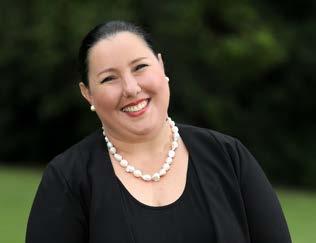
2 minute read
Mini Certificate of Gifted Education – University of New South Wales
The Gifted Education Research, Resource and Information Centre (GERRIC) is at the forefront of providing gifted education in Australia and is a part of the University of NSW. Across two days in Term 3, 24 participants across the three King’s School campuses completed the Mini Certificate of Gifted Education online. There were 14 from the Senior campus and five each from the Prep and Tudor House campuses.
This course aims to provide practical, research-informed professional learning to teachers and school leaders on a variety of topics pertinent to high potential and gifted learners, such as:
• To explore common myths and beliefs associated with giftedness. • To introduce and further develop understanding of Gagné’s
Differentiated Model of Giftedness and
Talent (Gagné, 2009). • To investigate cognitive and affective characteristics associated with giftedness. • To discuss the principles of an effective identification process and introduce tools to identify gifted students including off-level testing. • To introduce differentiation strategies and concept-based curriculum. • To recognise characteristics associated with underachievement and discuss strategies to address and refocus behaviours. • To review the research evidence surrounding ability grouping and acceleration. Participating teachers commented on their ability to decipher aspects of often confounded understandings of gifted learners. Callahan (2018), outlines any consideration of the characteristics of gifted and talented students must be multifaceted, incorporating a range of conceptions and definitions of giftedness. The exploration of the common myths and beliefs challenged teachers to reframe their thinking. Differentiation of instruction calls on a teacher to recognise student differences and respond with learning experiences matched to demonstrated individual student need. (Tomlinson, 2003)
“The range of provisions I can provide to support gifted students in my class has
increased and as a result I have been more strategic in my groupings and I am providing a greater degree of differentiation in my delivery and not just content by including Bloom’s and William’s activities and adjusting the pacing for my high ability students”. Emma Johnson.
“The ability to decipher that “gifted” and “talented” are two very different things; and that differentiation of teaching and learning should focus as much on extending talented students, as being inclusive of students who need extra
support.”David Massingham.
I found it to be a real positive to challenge the way that we all need to realise that a ‘one size fits all’ approach is not enough to meet the requirements of many of the students that we teach.” Anthony Attard.
Identification of students by all teachers is the foundation of any successful program for high potential and gifted students.
“All teachers at our School should be familiar with and have the capacity to use the gifted identification tools”. Warren Esdaile.
Understanding the variety of behaviours that can be exhibited by students, both negative and positive helps teachers to identify students within their classes.
“The misconception that gifted students behave in a certain way and always achieve highly was challenged. I am more aware and can look for ways to support those students to become more engaged across a variety of areas”. Zoe Tonge. Kathryn Fraser Head of Academic Enrichment and Extension








